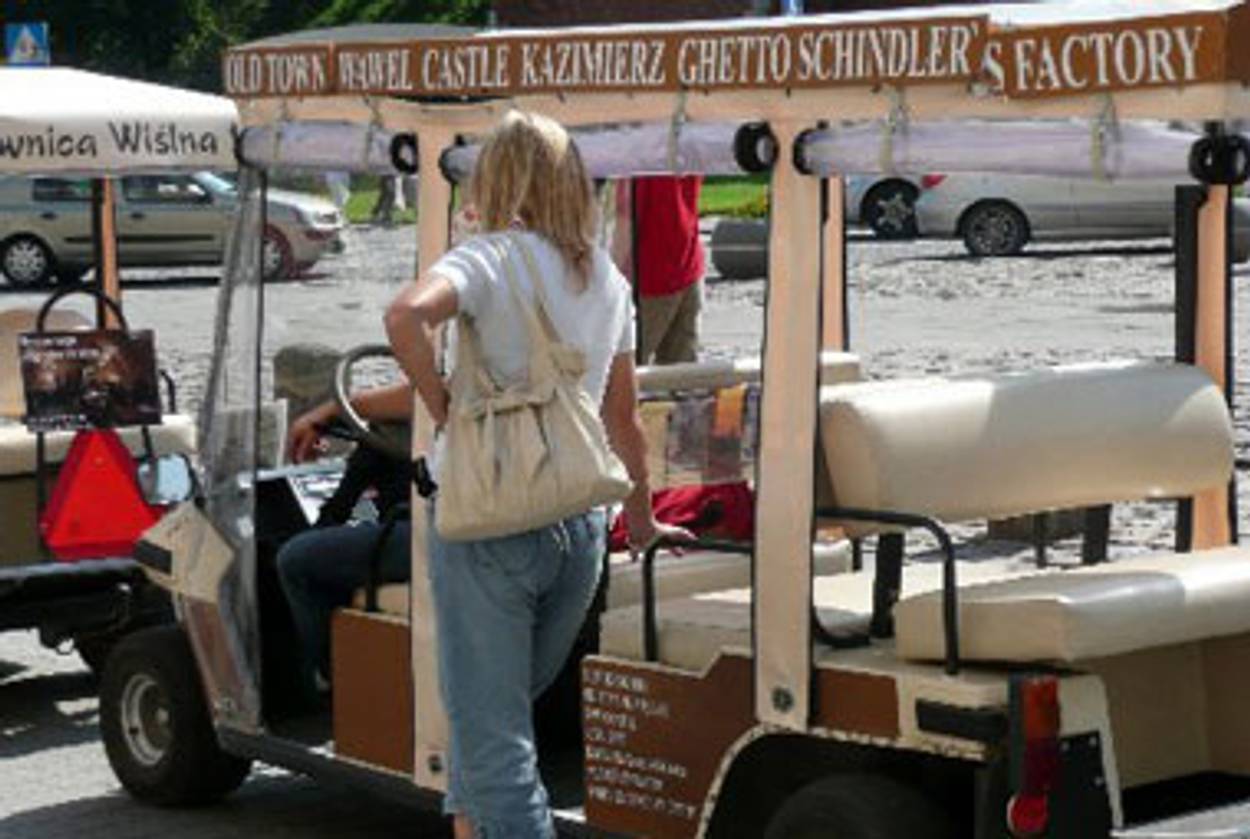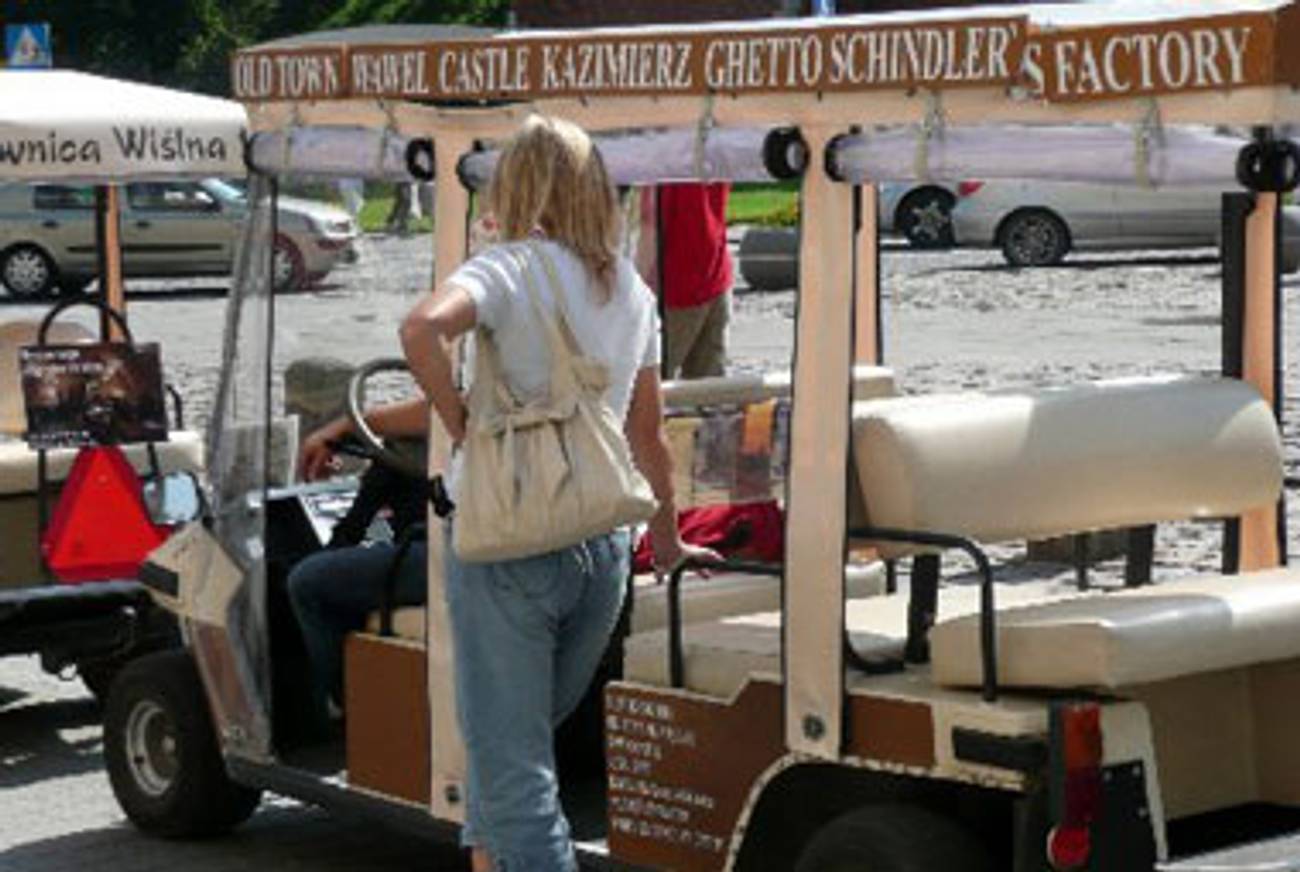Letter From Krakow
At annual culture festival, Jewishness is abundant; Jews, scarce




It is late night in Kazimierz, the Jewish Quarter, and we have just lined up outside of a club for an hour and a half to gain access to a smoke-filled basement for the midnight show. The crowd is boisterous and heaving, surging forward to get closer to front. Behavior typical if a pop tastemaker like Lady Gaga was about to jump on stage, but less common, I would imagine, for the cluster of Jewish musicians who were soon to navigate a two-hour jam session. The age of the crowd was even more surprising. Most appear to be under 21. This is the kind of audience that would have the more continuity-obsessed members of the American Jewish community salivating, if it were not for the fact that few of them are actually Jewish.
The Krakow Jewish Culture Festival is a crazy, magical scene. A mixture of Eastern and Western Europe, music and culture, Jewish and not. The closest thing the Jewish world has to Glastonbury, the giant English festival that had ended just days before. The program is a carefully curated, loose yet contagious mix of Jewish sound, ranging from the infectious Sabbath chanting of the Benzion Family, who are like the Jonas Brothers but old and Hasidic, to The Other Europeans, a troop of klezmer and Roma gypsy musicians who spar with their instruments to explore the connectivity of their respective musical cultures.
The only shame is that the festival is such a well-kept secret in the United States. Young Jews in particular would flock to this creative cacophony if only they knew it existed and there are no doubt thousands obliviously Eurorailing in the vicinity. In their absence, the festival is left to an audience of predominantly young Catholic Poles who lap it up voraciously. The majority were born four decades after the atrocities of the Second World War, coming of age in a post-communist Poland. Faced with myriad identity issues, they appear to be using the festival to work out their questions one song at a time.
Krakow is a town in which the Holocaust is everywhere—thanks to the battery of brightly colored wagons, little bigger than golf carts, that litter the streets, energetically competing to lure visitors onto a series of niche tours they market via menus emblazoned on their sides. Trips to Auschwitz, “Kazimierz Ghetto,” and “Schindler’s Factory” are advertised alongside “Pope’s Krakow” and Wawel Castle as if they are all great days out for the whole family, despite the fact that while the last two are national jewels, the former are scars that stretch across the heart of the city. 65,000 Jews lived in Krakow before the war, amounting to 25 percent of the population. They now number a mere 200. Their absence hangs heavy, and if these tour carts were the sole custodians of their memory, they would surely soon be forgotten. But over the past 19 years, the Krakow Jewish Culture Festival has provided a critical public space for its audience to grapple with the stains of their history. This tangled phenomenon has been well-documented by the remarkable Ruth Ellen Gruber in her book Virtually Jewish: Reinventing Jewish Culture in Europe and our first encounter with it on this evening served to underline just how complex a task it can be.
In the club, the crowd was baying for the band to take the stage, eager to see the musicians ply their trade at close quarters in this intimate setting, but in their stead, a lone American emcee stumbled on, sporting a curly-haired-yet-balding look, like a younger, leaner, less successful Richard Simmons. His attempts to foster witty banter with the crowd fell on deaf ears, as the audience was largely Polish-speaking. This ersatz Simmons floundered until an anonymous American voice from the back of the club reminded him that it was music they had come to see. Relieved to have an English-speaking foil, albeit a hostile one, Simmons relentlessly baited his heckler, demanding he “come up here and tell us what kind of a bad day you have had that gives you the right to be Mr. Rude and bring us all down like that!” The crowd split as the mystery American was goaded to the stage. With the microphone shoved suddenly in his face, the interloper took a deep breath, calmly leaned forward, looked his nemesis straight in the eye and with measured words intoned: “I have had a bad day…because…I went to Auschwitz.”
The room turned still and silent. The scrawny emcee, flustered, was frozen for a beat as his quarry slipped back into the audience, leaving him alone in the spotlight. He staggered to one side and attempted to segue into an awkward monologue about how harsh trumpet playing can be on both your lips and cheeks before limping off, crushed, to exit stage left.
If that performance was appalling, we did not have to wait long for the innate beauty of the festival to reveal itself. Daniel Kahn, the Berlin-based purveyor of Radical Yiddish Song ambled onto the stage armed only with a well-worn ukulele and his low-affect, mischievous charisma, effortlessly using both to make the sorrows of the past speak to the turmoil of the present. He wasted no time in calling New York based songstress Judith Berkson to duet with him, even while confiding that the two had only met an hour before. As he framed the song they had chosen to perform, a Yiddish ballad called “Dem Milners Trehren” (The Miller’s Tears), a lamentation sung by Jews who had been driven from the land they had lived on and farmed for generations, he added that its message felt especially pertinent in the light of the grinding economic woes we face today. The duo launched into a simple yet haunting rendition of the song, conjuring a sound which would not have been out of place on a Jens Lekman album. As they traded harmonies and verses, Kahn occasionally switched into English to lull the audience with the song’s lyricism as well as its tenor, reaching back into the past and hauling it into the present with a ferocity and an emotional power that silenced the room once more. This time, for all the right reasons.
Roger Bennett visited the festival as part of a delegation from Reboot and the Idelsohn Society For Musical Preservation.
These articles are not currently attributed to anyone. We’re working on it!